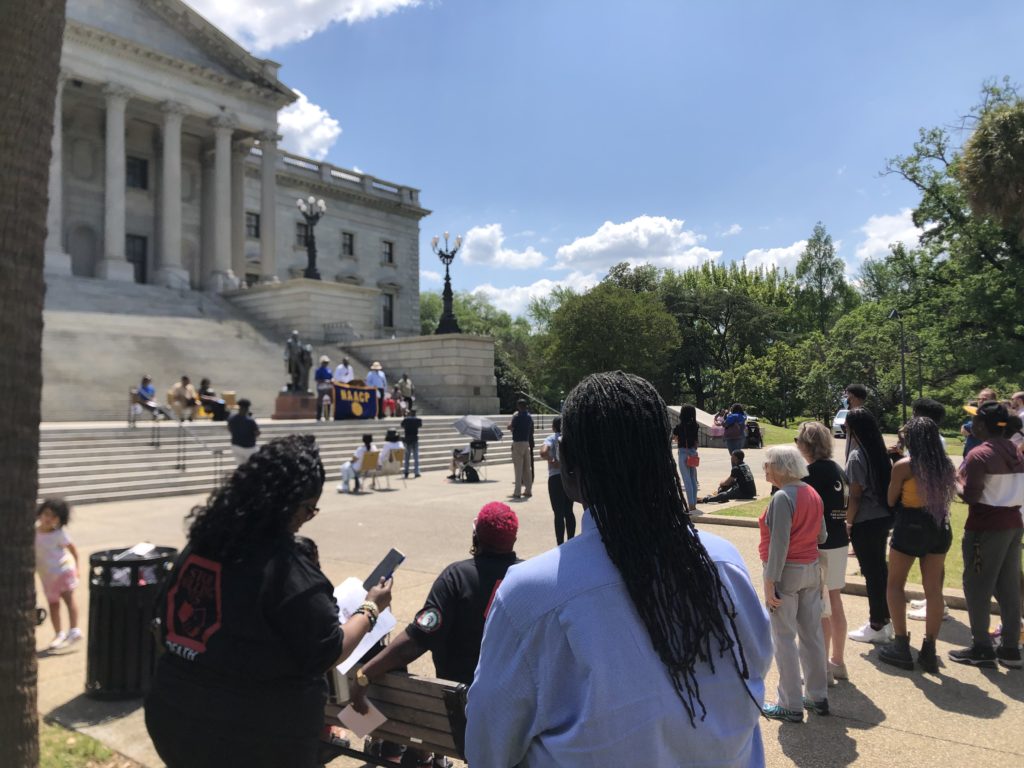On April 23, people from the community, clergy, and activists rallied against the death penalty and called on Governor McMaster to commute the sentences of Richard Bernard Moore, Brad Keith Sigmon and others on the state’s death row. They also called on the state’s legislature to pass Bill H-3620, also known as the Clementa C. Pinckney Hate Crime Bill.
Richard Moore’s case
Richard Moore’s case exemplifies the endemic inhumanity and racism in the racist mass incarceration system. He was given the choice between the electric chair and firing squad after corrections officials alleged they could not procure the drugs needed for lethal injection. In a written statement, Moore said that he did not concede that either form of execution was legal or constitutional, but given the forced alternative the state presented him, he would choose death by firing squad given that he more strongly opposed death by electrocution.
In his statement he said, “I believe this election is forcing me to choose between two unconstitutional methods of execution, and I do not intend to waive any challenges to electrocution or firing squad by making an election.” He is also separately asking a federal judge to consider whether the firing squad and electric chair are cruel and unusual forms of execution.
On April 20, Moore’s attorneys were able to win a temporary stay of execution, citing pending litigation around the constitutionality of South Carolina’s barbaric execution methods, and disputing the proportionality of Moore’s punishment to his crime. Moore’s execution, which had been scheduled for April 29, would have been the first execution by firing squad in South Carolina history. Currently South Carolina is one of eight remaining states that still use the electric chair.
The racist, anti-working class death penalty
At the rally, Rev. J.M. Flemming of the Greenville, South Carolina, branch of the NAACP pointed out how the death penalty, prisons and state violence generally target nationally oppressed and poor people, saying: “The death penalty has a way of picking certain groups of people to put to death: Black, Brown, mentally ill, and the poor … These are the groups that face the electric chair, face mass incarceration.”
Fleming continued, recalling the fundamentally racist character of the U.S. criminal-legal system, saying: “The system is not fair. Matter of fact, the system was not designed to be fair for Black folk and people of color.”
A representative from the South Carolina Christian Action Council highlighted the class reality of state violence further, stating, “Often, the poor and the dispossessed die in state-sanctioned executions … the rich, never …”
In the United States, the death penalty as we know it is historically rooted in the racial terror of Jim Crow. It is practically a legalized form of lynching. Today, Black people represent approximately 13 percent of the U.S. population, but 42 percent of people on death row. Further, research reveals that those convicted of murder are 17 times more likely to receive the death penalty when the victim is white than when the victim is Black.
The organized fightback
Speakers at the rally recognized the need to fight back against the racist system of state violence. Rev. Kennedy, the SC NAACP Prison Committee Chair, said in prayer, “We need to fight … Racism is trying to take us back, all the way back to the times of Jim Crow … A fight needs to take place.”

Speakers also exposed the contradiction in the priorities of the state’s General Assembly, which has recently attacked the rights of women, transgender people, and so-called “Critical Race Theory.” This is the same General Assembly which passed a law to form a firing squad in 2021, while currently, South Carolina is one of two states that has not passed hate crime legislation into law. Courtney McClain, president of the SC NAACP Youth and College Division said, “They’re trying to erase our history. They’re trying to physically kill us.”
McClain called on people to take action by signing an online petition here, and by joining and becoming active in organizations that fight for social justice. Organizations at the rally included the SC NAACP, South Carolinians for Alternatives to the Death Penalty, the South Carolina Christian Action Council, P.O.S.T. (Protect our Stolen Treasures), Carolina Peace, the Urban League, and the Party for Socialism and Liberation.






